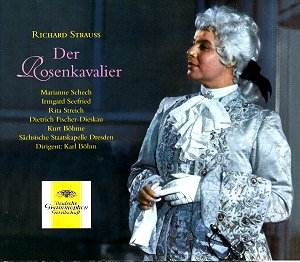There are many great recordings of this marvellous
opera. Indeed Karl Böhm was at the helm of one of them a few years
before this DG recording. That was when, in 1955, he conducted it with
Leonie Rysanek, Emmy Loose, Kurt Böhme and other Straussian luminaries
with the Vienna Philharmonic for Decca. Decca also produced a complete
version (the first ever) under Erich Kleiber with Reining, Weber, Jurinac,
Gueden and the Vienna Philharmonic. We should not forget Karajan’s legendary
recording with Schwarzkopf, Ludwig, Stich-Randall, Edelmann, Waechter
and the Philharmonia Orchestra for Walter Legge and EMI. This transfer
from 1959, again under Karl Böhm, stands alongside them as one
of the finest, the cast fairly glittering in its star quality.
Böhm, like Kleiber before him, does not hang around,
indeed the opening orchestral introduction, before the dawn chorus,
fairly takes your breath away with its turbulence; a little too rushed
for my taste. Though Schech does not have a consistently beautiful voice
(her monologue is rather variable in quality) she imbues the role of
the Marschallin initially with passionate ardour; something which she
clearly is not getting from her absent husband the Feldmarschall. She
brings tender affection to her bed scene with her lover Octavian, and
finally regal dignity. The course of her transition out of womanhood
is crucially reported to her hairdresser Hippolyte, ‘Today you have
made an old woman of me’. It is not for nothing that after that that
she decides to send Octavian as ambassador to carry the silver rose
to Sophie, knowing full well the likely outcome. Seefried’s glorious
portrayal of Octavian reciprocates her lover’s feelings with all the
arrogance and angry jealousy of youth, life stretching before him/her.
Unbeknownst to him there is the awaiting love of and for Sophie Faninal.
Her transition into the physical and vocal disguise of the Marschallin’s
maid Mariandel is nothing short of delicious, and one can understand
how the stupid Ochs von Lerchenau fell for her. One has the feeling
that in life as well as on this particular operatic stage, Schech and
Seefried were true to life, the former in the twilight of her singing
career, the latter approaching its zenith. The Marschallin herself says
to Octavian that she tried to stop the march of time by stopping the
clock in the middle of night, but to no avail.
In this wordy opera (Strauss even accidentally set
one of Hofmannsthal’s stage instructions), the diction of all of the
singers is impeccably clear as a mountain stream in its Viennese dialects,
whether in the refined language of the aristocracy, in the crudely bumbling
patois of Baron Ochs (though in his case Böhme avoids Viennese
and veers towards his native Saxon), or as parodied by Octavian in his
disguise as a maid. As the idiotic, yet ultimately pathetic Baron, Kurt
Böhme, soon to join Solti’s cast in Wagner Decca Ring as
the giant/dragon Fafner, characterises Ochs to the full. He vocally
exploits the extremes (down to a bottom D) of comedy and tragedy, vain,
above his station, a coward when it comes to a duel with Octavian. This
is clearly a man with unattainable aspirations, a man who loves the
sound of his own voice. Listen to how, in Act One, he simultaneously
conducts a serious conversation with the Marschallin proclaiming his
intention to woo Sophie von Faninal, and at the same time, in a serious
of asides, woos Mariandel and tries to set up an assignation - lots
of words but all of them clear.
As Sophie, the deliciously graceful Rita Streich is
ideal, virginal, sweetly innocent, and seductively beautiful of voice,
far too good for Ochs and just right for Octavian as he soon realises,
for the Marschallin was right after all. There is also the added bonus
in the cast of Dietrich Fischer-Dieskau as her father, admittedly too
youthful sounding at the age of just thirty-three.
Shortly after the war Georg Szell made the notoriously
insulting comment to the Vienna Philharmonic Orchestra in a rehearsal
for this opera, ‘Gentlemen, you do not seem to know this score’. No
question of that when it comes to this ‘Zauberharfe’ (Magic Harp) orchestra
called the Dresden Staatskapelle, for they too were steeped in the Strauss
tradition and it shows. Any lover of Strauss’s miracle opera may go
for certain key scenes, the Presentation of the Rose, the love duet,
the final trio for the Marschallin, Octavian, and Sophie, as well as
other gems such as the Italian singer’s cameo serenade (the young Pavarotti
did it but here it is creamy Rudolf Francl) in the levée scene,
or the orchestral sequence of Viennese waltzes. However this is a set
to listen to from start to finish, omitting nothing.
Christopher Fifield


